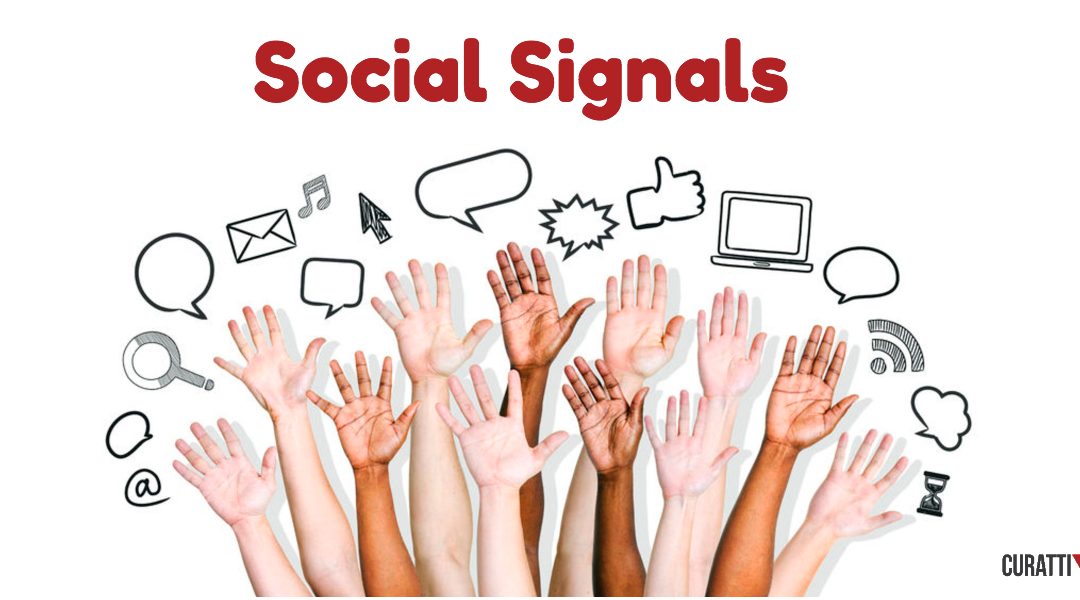Social signals refer to a webpage’s collective shares, likes and overall social media visibility as perceived by search engines. These activities contribute to a page’s organic search ranking and are seen as another form of citation, similar to backlinks.
Social media now affects an online store’s SEO directly, beyond just serving as a channel for messaging and customer acquisition. Because of this, developing a unified social media strategy that emphasizes promoting high-value campaigns, sales, and products is more crucial than ever for e-commerce operations.

Social Signals in SEO
In SEO, the term “social signals” refers to how search engines interpret a website’s social media presence. This implies that social media actions like likes, shares, comments, and followers can affect how highly a website appears in search engine results. Because they shed light on a website’s overall authority and reputation online, social signals are significant. A website’s likelihood of being considered a reliable source by search engines increases with the number of social signals it possesses.
Social Signals Impact SEO
Search engine results for a website can be significantly impacted by social signals, which are actions on social media platforms like likes, shares, and comments. As a sign of high-quality content, search engines like Google actually give preference to websites with high levels of social engagement. Thus, you should be aware of your social signals if you want to raise your online presence and optimize your SEO.
The Importance of Social Signals for SEO
The importance of social signals for SEO is a topic that has been debated among SEO professionals. While social signals may not have a direct impact on search engine rankings, they can still play a role in an effective SEO strategy. Here are a few reasons why social signals are still considered valuable:
Indirect Influence on SEO: While search engines like Google have stated that social signals are not direct ranking factors, social media activity can indirectly impact SEO. Social signals can contribute to increased website visibility, traffic, user engagement, and brand awareness, which can ultimately influence search engine rankings.
Content Amplification and Reach: Social media platforms provide an opportunity to amplify and distribute content to a wider audience. When content is shared, liked, or commented on, it can increase its visibility and attract more website visitors. This can lead to more backlinks, mentions, and citations, which are important SEO factors.
Brand Building and Authority: Social signals can help build brand authority and credibility. When users engage positively with a brand on social media, it can enhance its reputation and increase the likelihood of receiving organic mentions and links from authoritative websites. These mentions and links can positively impact SEO rankings.
Referral Traffic and User Engagement: Social media platforms can drive traffic to your website. When users click through to your website from social media and spend time engaging with your content, it can signal to search engines that your website provides valuable and relevant information. This can potentially impact your SEO rankings.
While the direct impact of social signals on SEO rankings may be limited, their influence on other important SEO factors such as website visibility, user engagement, and brand authority should not be overlooked. Incorporating social media into your overall SEO strategy can help amplify your content, increase brand exposure, and drive relevant traffic to your website.

Social Media Impacts SEO
Social media can have several indirect impacts on SEO. While social signals (likes, shares, comments) themselves may not be direct ranking factors, social media can influence SEO in the following ways:
- Increased Website Visibility: Sharing content on social media platforms can increase its visibility and reach a wider audience. When more people see and engage with your content, it increases the likelihood of attracting backlinks, mentions, and citations from other websites. These backlinks are important ranking factors for search engines.
- Content Distribution and Amplification: Social media provides a platform for content distribution and amplification. When your content is shared and reshared by users, it can reach a larger audience and potentially attract more organic backlinks. This can positively impact your SEO rankings.
- Brand Awareness and Authority: Active engagement and positive sentiment on social media can help build brand awareness and authority. When users engage with your brand and share your content, it can lead to more mentions and references from authoritative websites. These mentions and references can contribute to improved SEO rankings.
- Increased Website Traffic and User Engagement: Social media platforms can drive traffic to your website. When users click through to your website from social media and spend time engaging with your content, it can signal to search engines that your website provides valuable and relevant information. This can potentially impact your SEO rankings.
- Social Media Profiles in Search Results: Social media profiles often appear in search engine results for branded searches. Having an active and optimized social media presence can help occupy more real estate in search results and enhance your online visibility.
- Social Media as a Source of User-generated Content: User-generated content, such as reviews and testimonials on social media, can influence SEO. Positive user-generated content can enhance your brand reputation and attract more customers, leading to increased website traffic and potentially improved SEO rankings.
While social media may not directly impact SEO rankings, its influence on website visibility, content distribution, brand authority, user engagement, and online reputation can indirectly contribute to improved SEO performance. Integrating social media into your overall SEO strategy can help amplify your content, increase brand exposure, and drive relevant traffic to your website.
Conclusion
The direct impact of social signals on SEO rankings may be debated, but their importance in an overall SEO strategy should not be overlooked. Social signals can indirectly influence search engine rankings by increasing website visibility, amplifying content distribution, building brand authority, driving website traffic, and enhancing user engagement. Incorporating social media into your SEO efforts can help amplify your content, increase brand exposure, and attract relevant traffic to your website. While social signals may not be direct ranking factors, their impact on other important SEO factors makes them valuable for improving overall online visibility and success.
